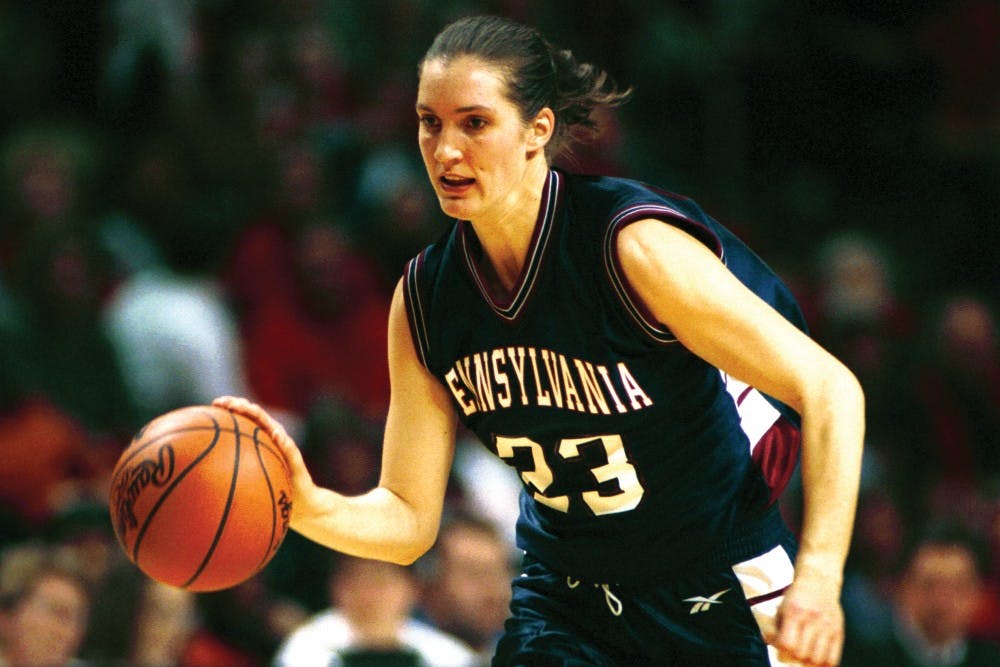Yankees legend Yogi Berra claimed his sport was “90 percent mental, and the other half is physical.”
While the statement now draws its notoriety from its mathematical absurdity, its message still rings clear. The real playing field is in the mind.
Penn alumna Diana Caramanico — a 2001 Wharton graduate and Penn women’s basketball legend — has a more sophisticated motto than Berra: Corpus Mensque. Body and Mind. And while she doesn’t have 10 World Series rings like the quirky catcher, her athletic resume also commands respect.
Caramanico is the most dominant basketball player to ever don the Red and Blue. The only Quakers’ player — male or female — to ever eclipse 2000 points, her scoring total of 2,415 points ranks second only to NBA legend Bill Bradley for the most in Ivy League history.
Caramanico obviously had very little in the way of obstacles — mental or physical — while she was steamrolling the Ivy League as a player. But while coaching middle and high schoolers after her playing career, Caramanico — who had always wanted to start a business — had an epiphany.
“I realized what’s holding these kids back is not whether their elbow’s down on their shot,” Caramanico said. “It’s that they’re afraid to fail, or afraid to take risks, or they constantly beat themselves up in their head about something that they’ve done, or they misinterpret things that the coaches tell them. Or maybe they get so focused on what the refs are doing that they take themselves out of their game.”
Her calling would be to train the mind, not the body.
“A lot of people can teach somebody the physical mechanics of shooting,” she said. “But I realized that my passion was to help kids and college athletes to maximize their potential with the skills they already had.”
Caramanico earned her master’s degree in applied positive psychology from Penn in 2011. Now a sports psychologist, she launched her business Corpus Mensque to “ensure that physical training is never done without developing productive habits of the mind and that resilience training for the mind is never done without addressing how it connects to and enhances the physical skills.”
Perhaps no sport is more strongly dictated by the workings of the mind than golf.
It is a lonely sport. There is no teamwork. You can’t catch a pass or set a screen. Loud verbal encouragement before a big shot is seen as distracting and taboo.
And with the long walks between holes and everything other than the 10 seconds per hole during which one’s club is actually being swung at the ball, golfers spend most of their time with nothing to do but wrestle the thoughts in their head.
Penn women’s golf coach Mark Anderson knows this, and he knows that there is only so much he can do. But after Caramanico put on an impressive presentation in a coaches’ meeting in January, Anderson reached out and brought her into the Penn Golf Center to work with the team just before Spring Break.
“We did some interactive stuff to get the players thinking about what they do individually, and what they could do to change their mindset, which was helpful,” Anderson said.
What are some common mental issues golfers can struggle with? Anderson offered a seemingly illogical, but common, example.
“Some of them feel that if they birdie the first hole, that’s not necessarily the best thing,” he said. “Because it can only go downhill from there.
“I thought it went well,” Anderson added, reflecting on Caramanico’s visit. “It was very interesting to look at the thought patterns that some of the players have.
“It’s not something that you can see on a scorecard ... you really don’t know the bad thoughts that they’re having. It was eye-opening to see some of the ways that [the players] are getting in their own way.”
Caramanico said she would be happy to work with her former team next if coach Mike McLaughlin came calling. After all, she has also worked with Penn lacrosse and field hockey, along with teams from several other universities.
But what business does a basketball star have working with a golf team? In Caramanico’s world, the court and the course are not all that different.
“The skills that I teach are rooted in positive psychology, and most of the skills are transferrable to all sports.”
So is Caramanico ready to take on all comers? Not quite.
After debating the issue for a few minutes, the Palestra legend was able to rule out one possible client, and not because of unfamiliarity with the sport
“I’ve had some time to think about it, and with Princeton women’s basketball ... I think I would have to say ‘no,’” Caramanico said. “Though my goal is to help athletes, I am pretty loyal to my alma mater.”



